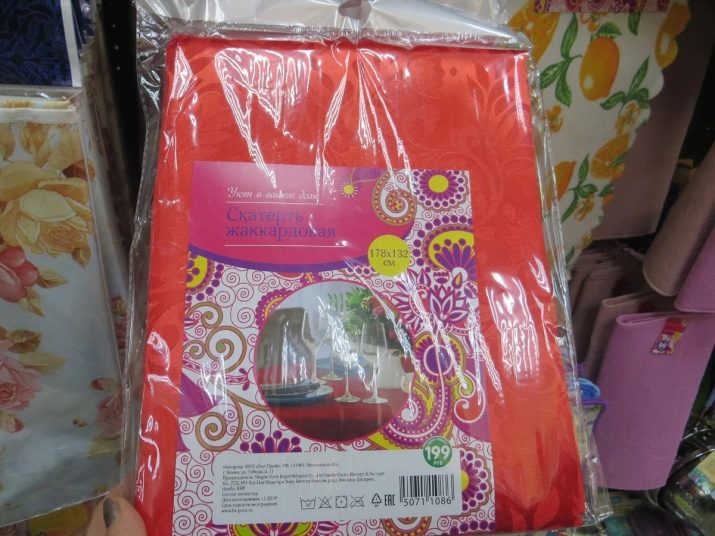All about jacquard tablecloths
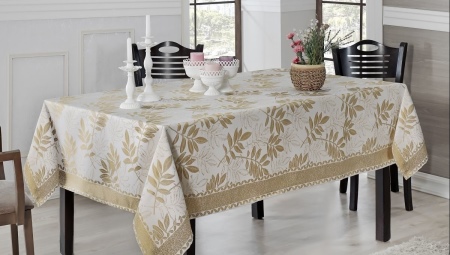
Compared to linen tablecloths or synthetic oilcloths, a jacquard tablecloth is a luxury item in the kitchen or living room. If you do not skimp on quality, then for a relatively average amount you can find a truly presentable element of decorating the room in which the dining table is installed.
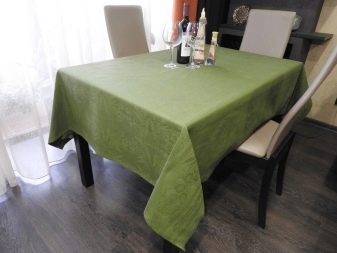
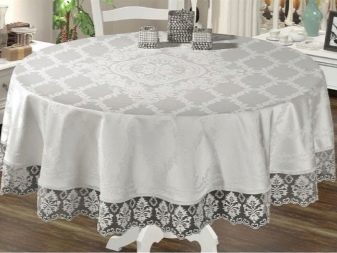
Advantages and disadvantages
Jacquard contains natural materials in its structure. Cotton, silk, linen are used for its production. Semi-synthetic jacquard is a completely natural variety and is much cheaper, since polyester is made from petroleum products and recycled plastic. Jacquard, woven from pure linen, is the most expensive variety in existence today. The look of such matter is really elite.
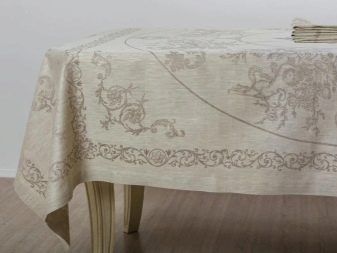
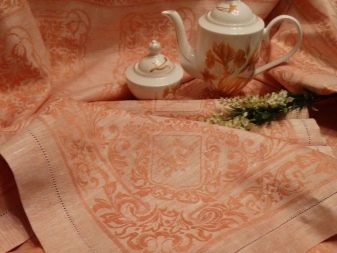
Thanks to a special weaving technique, jacquard has the following positive qualities.
- The material is highly durable, does not lose its shape and is weakly stretched, which allows tablecloths, and other products, to gain a long service life. An example is jacquard blankets, passed down through two to three generations.
- Fits into almost any interior. Classic, modern, loft - everywhere a tablecloth made of this material looks very appropriate.
- Insensitive to washing mode: completely natural materials are not afraid even of boiling with bleaching. Ironing is not required - unlike thin cotton or linen, the piece of furniture will straighten out on its own. Special care for such a product is also unnecessary.
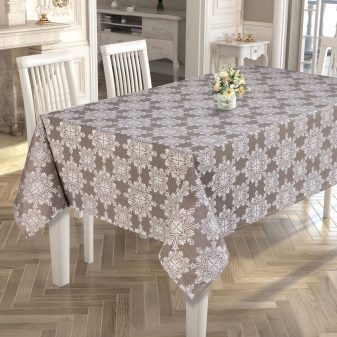
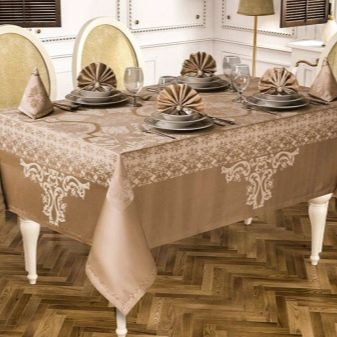
The disadvantages are as follows.
- Shrinkage, as a result, loss of the original size. After several dozen washes, the edges of the tablecloth spread out on the table will rise by reducing the length and width of the product.
- High price. Natural and high quality materials have never been cheap.
- Opportunity for Turks and Chinese to counterfeit Russian counterparts. Before buying, check the quality of the product personally. In China, it is common practice to weave polyester into the material.
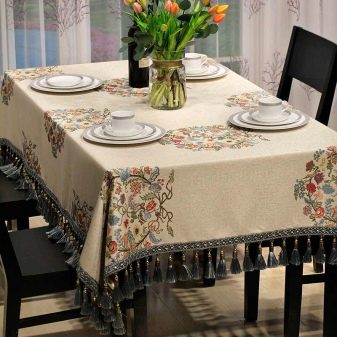
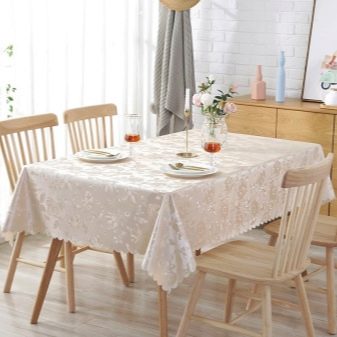
Finally, the fabric should not be washed in an overly acidic or alkaline solution. If this requirement is violated, then the material will prematurely wear out, its service life will noticeably decrease.
Varieties
Mostly jacquard are natural fibers. If you add plastic threads, which, in fact, are synthetics, the consumer qualities of the jacquard modified in this way will increase. The density and strength of the material coexist successfully with good air permeability.
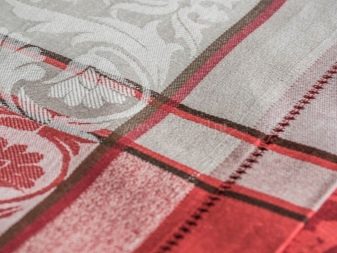
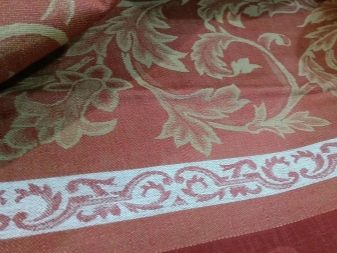
The satin tablecloth is made with the use of satin (artificial) fibers. She sets the perfect tone for dining room design. The material is not fuzzy in itself - its texture resembles a silk fabric. The type of material is convex on one side and concave on the other. The fabric does not wrinkle or tighten in arbitrary places. The number of threads weaves is 170-220 per square centimeter.

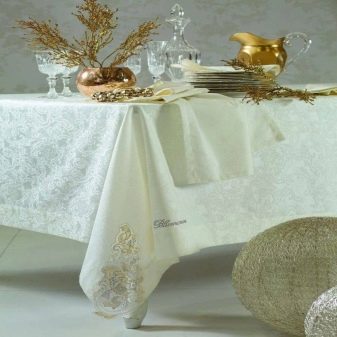
Satin jacquard for tablecloths is the table material. Domestic fabric, supplied from Ivanovo, is used for tablecloths and blankets, in which natural and artificial fibers are distributed in optimal proportions. It looks light, breathable and holds its shape. Gold and silver patterns embroidered on it give the items a luxurious look.
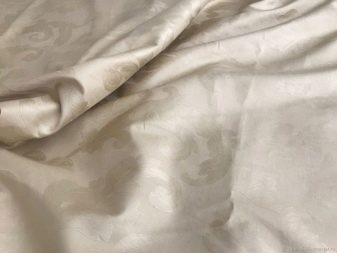

The fabric has a glossy shine - silk and synthetic fibers bring shine to it. It does not wrinkle, strong and dense. The pattern is mirrored on both sides. Satin jacquard is considered a rarity - it is used more for curtains that do not let in light than for tablecloths.
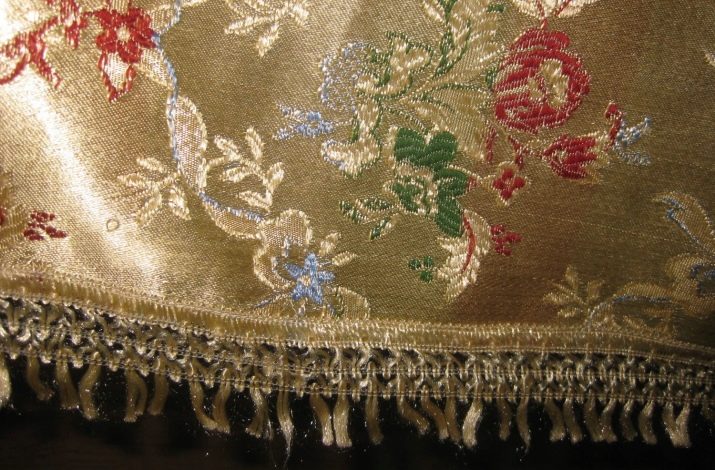
In addition to the composition of the material, tablecloths are subdivided according to their shape: round, square (or rectangular), oval. Choose them according to the shape of the table for which they are intended. By colors - from white to bright colors, except for black.
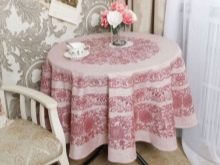
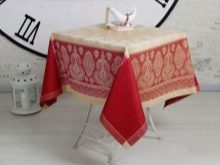
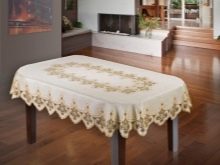
Popular manufacturers
"Yakovlevskiy jacquard" ("Yakovlevskaya manufactory") - an old factory operating in the Ivanovo region since 1870. Its competitor is the Good Night company, located in the same city.
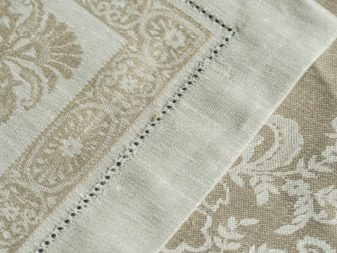
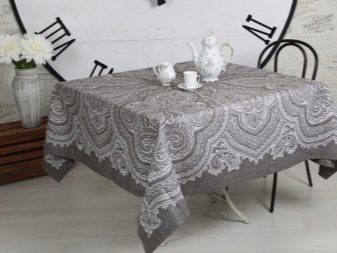
The most famous foreign firms are considered to be Polish firms - "Firanka", Haft, Wisanproducing fishnet products. In France, for example, tablecloths are produced by Alexandre Turpault and Garnier Thiebaut.
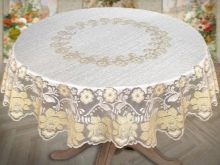
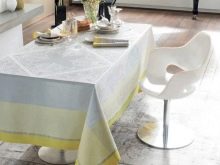
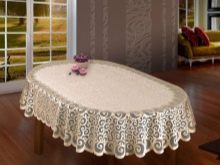
The French assortment is also represented by brands Asabella, Arya, Cleo, Do & Co, Karna, German Grass and Primavelle.
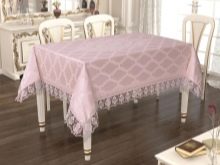
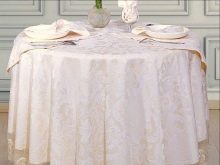
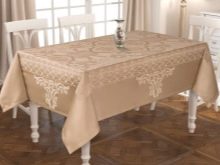
Nuances of care
Care rules are as follows:
- alcohol, acetone, dichloroethane, benzene, gasoline cannot be used for washing jacquard;
- it is forbidden to exceed the temperature of 30 degrees with each wash;
- chamber drying and spinning at high speeds are excluded;
- it is not recommended to dry tablecloths in direct sunlight.
Ironing is an unnecessary action: the material will straighten itself after drying.
